Interlude no. 2: on the ‘gnostic’ tendency in Vallée (and in UAP theory more generally)
There is a great tendency among some who have steeped themselves in the many puzzling, eerie, bizarre, disturbing, even scary UFO reports that exist to see at work a structure of reality not generally accessible to us—at least not as a matter of course. As with so much in the UFO literature, this immediately leads to a schism: believers, readily accepting of the reports of “high strangeness” in connection with the UFO experience; and those keen on dismissing such as tall tales, hallucinations, misperceptions mythologized, and so on with the usual (and predictable) litany. The whole schism is predictable. But what about the curious, those who wonder … surely outright credulity is wrong, but so is a skepticism born not from a close engagement with the reported facts, but more from a desire to uphold convention (as deeply buried as it might be, as we have elsewhere suggested)? There is always Socrates’ question to Euthyphro, which we had earlier conjugated for our present purposes—one that could be posed to the credulous as equally as to the hardened and reticent skeptic: am I skeptical of the strange because it is a thing worthy of doubt, or do I doubt the strange just because I’m skeptical? In the former situation, it supposes I have some closer relationship to the object of my doubt before I doubt it. Here doubt arises a posteriori. In the latter, the skepticism is fundamental to my relationship with the object of doubt—and here the doubt is a priori. True skepticism, skepticism that would be neither automatic nor dogmatic, must be undertaken for each and every case, taken up so that the case may teach us how to be skeptical because of it, not in spite of it. To spite the facts, come what may, is to destroy the genuine spirit of skepticism as a spiritual practice of freedom from the tyranny of false belief, superstition. (I am not afraid of the Enlightenment on this point. We would do well to return to what is valuable in it.)
When dozens of people report a bizarre phenomenon with
consistency, I am curious. When thousands do, I am in absolute wonder. When you
find dozens, even hundreds of stories of seemingly similarly bizarre, eerie,
disturbing and scary reports of encounters with beings, and sometimes also with
aerial phenomena strongly reminiscent of our contemporary UFO sightings this,
too, makes me wonder. But the leap towards a grand, unifying hypothesis,
reliant upon the uncriticized (and in many cases unverifiable) testimony
of individuals from radically different cultures separated by vast distances of
space and time—this causes skepticism in me. And to then, seemingly on
this basis, posit the existence of a vast, hidden structure of reality of which
these incidences are but the proverbial tips of the iceberg—again, here I am
moved more towards a deeper skepticism, where wonder ceases and a sobering criticism
takes over. Surely it is right to suggest that, as such a hypothesis would
require, we human beings are profoundly disadvantaged epistemically: we are
frail, fleeting creatures inhabiting a perhaps peculiar pocket of what is,
surely, a vast structure of reality about which we know very little. In an
intellectual biography on the great quantum revolutionary Niels Bohr, rich in scientific
concepts and the formative moments of the two pillars of contemporary theoretical
physics, the author Abraham Pais points out that only as recently at the beginning
of the twentieth century were we still debating what light was. Light—the most
elementary aspect of our life, the source of so much wonder throughout the
ages. And still it is hard to wrap our mind around the ontology of light implied
by our best theory of it. It remains an open question—because the quantum
theory remains interpretively open to this day, one hundred and twenty-two
years after its earliest sketches. There is a sense in which, as for much of
the most theoretical of physics, we must content ourselves with only a passing phenomenological
acquaintance with the world. But this is the humility that, at least for me, the
sciences teach us. We can get a handle on a certain structure of
reality, but only of a greatly restricted domain, and then only with certain
concepts which depart—sometimes radically, sometimes slightly—from the sweep of
(and what shall we call it?) our “lifeworld”, the bubble of meanings, seemings
and concepts which we, for whatever reason (evolutionary?), inhabit. This is doubtless a frustrating fact.
But surely we are more than this, surely our
access to the structure of reality is a good deal greater than this empiricism
would have us believe… Where does this thought come from? If you
tell me it derives from the deepest religiosity or spirituality of humankind,
then I say that for every spiritual doctrine deriving from this intuition of transhuman
knowledge-beyond-knowing, there is equally one to counter it: the Buddha against
the spiritual metaphysicians of India; Socrates against the prophetic Euthyphro;
the New Scientists against the medieval Schoolmen, for the simple fact is that,
even if there is this grander structure of reality mostly hidden from us (and surely there is!), we must
accept that we begin where we begin, in ignorance, and that knowledge—however vast
a system awaits us—must be patiently discovered step-by-step. Many of these
spiritual “skeptics”, then, seek a middle way, and shun all
aggrandizement of the human all-too-human, even while pushing for growth, change,
even transformation. But these grander notions must always be tucked
away as we do the hard work of discovery. Only later can we unfurl the grandeur,
and luxuriate in its results, after which we quickly recognize the temptation to
think it all discovered, finally. Yet more stupidity to be humbled by our new
ignorance. Few philosophers or religionists are capable of this middle way. It
is an unstable position.
These observations lead me to reflect—if I may be permitted an
extended polemical exercise in this post—on the so-called “gnostic” orientation
in the ufological theory of Jacques Vallée.
In his Authors of the Impossible of 2010 (which we
here follow closely on pages 144-146), Kripal writes that “Jacques Vallée
dwells exactly where I have suggested the contemporary gnostic intellectual
dwells, that is, in a modern form of gnosis or forbidden knowledge well beyond
reason and completely beyond belief.” However: “These are my terms, not his”. Kripal
continues, writing that nonetheless,
his [words come] remarkably, astonishingly close. He too, after all, uses the phrase ‘beyond reason’ to describe his subject matter, and he presents his life as a passionate pursuit of ‘forbidden science,’ the title phrase of his published journals that speaks of a radical rejection of reason’s claim to exhaust the possible. He is dismissive of ‘the constipated rationalists who are the new arbiters of French thought.’ He similarly scoffs at the Enlightenment rationalist philosophers who trapped us all in a boring ‘bureaucratic cage for two centuries’. And he is positively disgusted with ‘the old scientists,’ who deny the very reality of the problem of UFOs. Vallée has already had enough of their reasonable, respectable nonsense in 1961, when he wrote his journals: ‘Our research would be emasculated by their lack of creativity and their need to reduce everything to that dull state of uniformity they mistakenly label as rationalism’.
Vallée instead prefers to understand his own spiritual sensibilities,
which we are assured he has, writes Kripal, as
expressions of mysticism, not religion. Mysticism, for Vallée has nothing to do with [institutional] religion and its doctrinal formulations. Rather, it is ‘an orientation of consciousness, a direction of thought away from ordinary space-time.’ … Beyond reason and belief, then,” Kripal begins to conclude his diagnosis of Vallée’s incipient gnostic orientation, he “writes as a man possesses, or better, is possessed by, a form of secret knowledge or gnosis. Such a third way of knowing is closely linked to what he calls ‘the higher dimensions of mind,’ which are traditionally expressed through the imagination, the realm of the fantastic, and, most recently, through science fiction. [Vallée wrote several such novels, and won the prestigious Jules Verne Medal for one he wrote in his early twenties.]
The real work on the enigmas of the UFO phenomenon, then, can
only be done well “beyond the surfaces of rationalism and religion.” It is,
Kripal explains, a “fundamentally esoteric project, the outlines and
implications of which we have only begun to glimpse. It is still too much for
us. So we hide it from ourselves.”
So now we must really wonder: what is the foundation
of what we have called Vallée’s morphological-phenomenological method? If it is
“gnostic” it is really just imaginative, a creative guess—certainly that’s not
something we ought to take issue with. But we are supposed to believe that it
is more than a creative guess. It is “gnosis”—access to a hidden layer
of reality which Vallée has managed (somehow) to penetrate. How? By “gnostic”
insight! What is that? Who has it, and how is it attained?
What I am not sure about is why is this term ‘gnostic’ or ‘gnosis’ is not just a word aggrandizing an ordinary, human, all-too-human capacity for creative imagination, a sense or feeling for things—which must in any case be tested against the things? Like all “theory” worth the name. I mean, surely we can be skeptical and interrogate our sense and feeling of things (of what is real, right or true) without us denigrating sense or feeling—excluding them as valid epistemic means? Surely, then, if we are able to interrogate sense and feeling, we can wonder whether they are veridical just because we have them? They are surely guides to what exists, but are they infallible? Surely not. We wonder, then…
I become skeptical of what is really meant by ‘gnosis’ other than yet another ideological trap of distorted self-belief and false conviction, covered over by a venerable term from religious history, where in invoking it we feel privileged for having had certain perhaps very radically anomalous experiences which we then believe has given us access to a truth, perhaps a “higher” reality than “the rest” (the hoi polli?) have been able to see, or can see.
What is the myth under which we then operate? It has a classical
form: In Plato’s Cave we’ve somehow broken the (“bureaucratic”) chains (of
conventional thought), ascended into the true light, been struck by a vision of
the Whole, only to return to teach others to make the ascent, who return the
favor with only blind disbelief in our visions. Except we forget, very
conveniently, that the Socratic form of this journey ends not in final
illumination of all truth, but only in the necessity to take the journey of
discovery, from a standpoint of self-discovered radical ignorance—not having
found anything definite for sure as yet—even after the journey of ascent, which
is, in truth, only meant to free us of our chains of ignorance alone.
(Plato is a good deal more suggestive and open-ended than his
interpreters tend to read him—perhaps starting with Plotinus himself, that
eternal wellspring of much mystical thought and speculation.) The danger here
is to mistake the map (an itinerary of freedom from ignorance) for a
specific territory of discoveries! This is the spiritual slight-of-hand of
the “gnostic”, which, when performing such tricks, loses its real, spiritual
authenticity—one rooted in self-emptying ignorance. The label ‘gnostic’,
then, belies another illusion, at least, perhaps, for Vallée: that he has
really understood the nature of the phenomenon by going ‘gnostic’, by entering
into the occult, the hidden, which ordinary rationalists (believer or skeptic)
simply won’t do. I claim Vallée hasn’t—any more than the believers or the
skeptics; but yet, somehow, he believes he has risen above them…
“Rationalism”—and I am not necessarily using this term with
its historical meaning—proceeds on the basis of the evidence to be found within
the realm of human experience, even experience of the anomalous. But
surely this is limited! the “gnostic” might complain, worrying that we trap
ourselves in a certain “bureaucratic cage”, and so on. Here now we see yet
another ideological trap into which those who have the conceit of “gnosis” may fall,
almost willingly. The “rationalist” does not think that, because one has had an
anomalous experience come crashing through the ordinary and the mundane, that
this is somehow, just because of the anomaly, evidence of a “higher
realm”, a “hidden” knowledge, and so on. Or rather, it is “hidden” but
just for the simple reason that we are limited beings with limited access to
reality, but who can, by patient work, expand the horizon of the knowable to
encompass the unknown. The “rationalist” is content to operate within the
realm of the liminal: grasping what little can be known, and conjecturing beyond
that into the unknown, but recognizing this to be tentative, something
which must be tested against the phenomenon. It seeks to render the unknown known,
through whatever revisions, renovations, revolutions, and delays may be
required in order to achieve this standpoint of determinate knowledge.
It would seem that the “gnostic” wants instead to leap ahead
into the unknown and, by the fanciful flight of an imaginative guess, come away
believing himself to have seen the truth of that unknown—something which
remains sadly obscured for the rest of humanity. It rushes too quickly into a fully-developed
conception of a knowledge that can only be achieved (for real) after a patient
development of theory as a tentative imaginative guess—to be tested,
patiently, against what evidence there is to be found within the phenomena
which leaps out to us as liminal, mysterious, and yet still as a known
unknown.
Thusly stated, do we need the gnostic gesture—do we need
a “gnosis” to get us where we’re going? That is, what is the difference, the
real difference, between “gnosis” and plain old creative imagination—which may
yield sound theoretical insights, but which, then again, may simply not?
What is called “gnostic” or “gnosis” I simply call intuition, imaginative or
speculative guessing, a mere propaedeutic to sound theory. Matured
to become theory, imaginative guessing—conjecture, speculation, gnosis …
does it matter?—must be put through the trial of the phenomena, tested
against it. It may not be conventional theory we are left with as we do this (and,
if our evidence is sound, that is indeed the way to bet). We are, after all, in
search for what the science could possibly be that is at once receptive to the
anomalous as anomalous, but accepts that there is a specific
challenge which, for example, the UAP as anomaly presents to conventional
thinking. But this is something we must attempt to work out from the logic of
the specific anomalous phenomena which we encounter in the UAP event.
To call Vallée a “gnostic” is not, we would hope, to grant
him a free pass—against an immanent critique of the failings of
Vallée’s own methods used to reach his gnostic hypothesis (if we should so call
it): the “Control System Hypothesis”. To cry “but it’s a gnosis beyond
reason!” is a trap, one which Socrates knew so very well to avoid.
One might call this a “mystical geography” of reason: a patient development of our conceptual grasp of the great and complex world around us, nimble enough to both encounter and finally to carefully grasp the anomalous in the realization of the greater expanse of Being itself—what the seventeenth century philosopher Spinoza would call “infinite substance”: God or Nature. “Hidden” then is a term not of confident “gnosis”, but of an ignorance we must admit, in wonder, before we can make that patient yet certain climb, which Hume somewhere so perspicaciously describes, up the mountain of the Real. Reason is capable of going beyond itself. This is the true wonder we face. It is the creative potential of science, as it is of art, of all the truly creative disciplines which teach us to see the world anew.
Beyond this interlude on Vallée as ‘gnostic’ theorist of
UFOs, I have, I must admit, a more philosophical and methodological point to
make, if I may be permitted to slip into a more polemical voice in so doing.
Indeed, I want to suggest that the ‘gnostic’ tendency is really very much
wrongheaded. And unhelpful. It’s too much, too soon, too quickly. Rather, I
want to argue in the direction of a strong and creative “rationalism” that
is flexible, open and rigorous. I want to pit “rationalism” against this
gnostic tendency, and by doing so—by reading “rationalism” against the
gnostic orientation—I want to renovate and revive “rationalism” for ufological
purposes.
 |
| Spinoza,“Rationalist” |




Robin Hanson wrote recently interesting thongs about UFO: https://www.overcomingbias.com/2021/03/explaining-stylized-ufo-facts.html
ReplyDeleteI'm not sure one can pit "rationalism" against "gnostic tendencies." The rational world is a place of Yes OR No. Gnostic ideas are often Yes AND No; There doesn't appear to be a place in scientific discourse that can accomodate the latter.
ReplyDelete